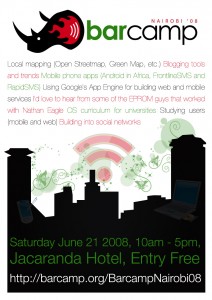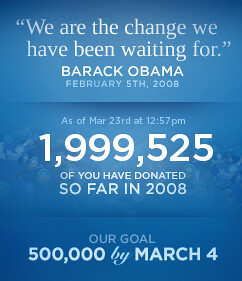
I wrote a response to egov Minister Tom Watson's latest speech, dissecting the interim report into The Power of Information report by Tom Steinberg and friends: Leadership in egov: what's missing? And Tom challenged me to, well, put up!
What should we be doing that we're not?
I usually imagine these challenges coming from between gritted teeth and with arms crossed (I am picturing actually seeing this from others), but Tom has already shown himself actually dialoguing with stirrers like moi so here goes.
The timing is neat and slightly spooky - it's one year since I started this blog, something I
should have done much earlier. And so I have
one year's worth of egov posts to scour for the missing ideas which Tom wants to hear but actually it just pops out because, as my egov friends know, I am the proverbial 'stuck record' on this stuff. This also may explain my occasionally ragged and cynical tone. Please forgive me.
Here's a top ten but #1 just leaps out from my latest
post on online suicide prevention.
~~~~~~
Ten things not happening in eGov
1. FindabilitySearch is the prime route to content and is followed by links from other websites. How government addresses this is through newspaper ads - see DirectGov - or, slowly, very limited textads and rare banner ads. I'm not aware of any strategy which looks at how people find services or information in the real world online. Most pages are not optimised for search, most top results are by fluke rather than design and most links by legacy. All of that is and will continue to end - there is competition online. If they can't find you, what's the point?
2. Disengagement from the wider web and those damned walled gardensThis is part and parcel of the reasons why findability is so bad for services and information - like suicide prevention. Links into government sites aren't there due to any effort, they're there because of luck - we're government so people sometimes refer to us. But as you can see with the growth of health websites, this isn't a given. We tend to still live in the world of 'build it and they will come' or 'look at our sexy website'. Not good enough any more. There seems to be no understanding of how to drive traffic, let alone how to target the audience online. It's offline strategy pasted onto online, largely. This all comes from a disengagement, possibly a mistrust, of the wider web. And it's about way more than just sexy social networks and 'engagement' with them.
3. Engaging the industryHow many government seminars and conferences include people from the wider web industry? If the people aren't there and if webbies in government have no power (
Jeremy Gould has a recent rant about this) and if web development in government isn't by webbies and if a self-reinforcing circle exists whereby public servants just talk to public servants, how will #2
ever evolve? In Australia, very early on, they brought the guru of usability, Jacob Nielsen, in to give a speech at the big annual shindig. That one speech reached the key people (Al Gore's strategy on climate change) and set the trend and embedded usability thinking in Aussie egov people. Outside engagement just isn't happening and it should. It's vital.
4. MarketingOnline marketing is increasingly sophisticated but it's also very basic. Asking for links, giving people content - anyone can do this, small websites do it all the time and it gets them traffic which has a reinforcing effect. Banner ads are the norm on the rare occasions when government does it (some rare, clunky, textads), but I would say this is the pick simply because it's comprehensible to Communications. Wider industry has been there and done that and is changing its attitude. Unfortunately, banner ads aren't anywhere near as efficient as other methods, such as search marketing. The failure around marketing is no more clearly shown than in the complete waste of millions than is e-citizen. Again, if they can't find you, what's the point?
5. Widgetising servicesThis is my particular bugbear because, to me, it's all about going to where people are online rather than forcing them through hoops to you and hence losing them on the way. That's the reason that widgets are all over the web nowadays - they work. The classic idea (well, mine) is to offer a widget which tells you when the bins are emptied - and slips in messages you want, such as recycling tips - to the local newspaper. Or the local social group. Or the specialist website. Or whoever the heck wants it. This still takes people back to you but it's a win-win. Any Google Maps work can be shared as well. Free content for them, traffic for you. Transport Direct already do one (though it's not promoted) but otherwise they're no-existent - we're still stuck in old methods.
6. Engaging the localThe general trend will be for local websites, including hyper-local and localised versions of services like Google Maps, and we already have targeted websites - the proverbial NetMums - but also ones most disabled people would pass through. What engaging means is things like offering free content such as guides - you have links for 'more details' at the end back to your pages, rather than ageneral link so they end up lost in your site. And widgets. You can even offer politician's best wishes to satisfy the enablers. This is another win-win because they'd all like the engagement, you help their users find your stuff, including services, and you both look good and get more traffic.
7. Cheaper usability methodsUsability is still thought of as tied into hiring professionals and mastering very complex ideas - that's rubbish. Cheap methods work in straightforward ways and this has been proved. Yes, professionals are needed and they are worth their weight, but most government websites cannot afford them or can't keep using them. Simple methods should be proselytized through government - like they are through the wider web - but they're not, it's still seen as a 'black art'. And do I have to explain why ensuring usability is absolutely essential?
8. ContentThis relates back to other issues which we do do well. I'm particularly thinking of accessibility, which egov is very good at beating itself up about. Yes, there are some issues with disabled people being able to use our sites (though that's as nothing compared to the disaster that is commercial website accessibility) but what's the point of being able to more easily click through to content when that content makes no sense. Much content, both Whitehall and local government remains all about Ministers, Councillors, programs, what we're doing - It doesn't answer the question, the task which the user is there for. Website content isn't 'user-focussed'. It's usually 'rah rah, look at how brilliant we are and, oh, here's some complex routes to some content you might actually want'.
9. Fixations on 'engagement'This particular 'bleeding edge' is all very well but it has lead to a severe imbalance in both resources and interest. I am actually quite fed up with being seemingly the only government webbie who has a basic grasp of stuff which webbies in the wider world take for granted like search engine optimisation or online marketing or usability methods - or any of the other issues above. Simply put, politicians love this but what good is it for users compared to the preceeding issues? From the outside looking in, do you really think edemocracy or finding out every last detail of the council's budget or whether we're adding comments to social networks is the #1 priority for citizens? This isn't to say it's not important or interesting or shouldn't happen, it's just way, way over prioritised.
10. Utilising reputationWith all of the above the difference with us is - we are government. We are generally trying to help people (no, really) and in many areas - like, for example, suicide prevention - services are pretty much politically neutral. This means we can ask for and get help, very often for free, from a wide range of the rest of the web. We also come with a built in online reputation simply because of who we are which, most clearly in search, is a solid foundation on which to build.
~~~~~~There could be more but ten is enough. Correct me if I'm wrong, but I don't think The Power of Information covered any of these points, although implementing it would help with some.
![Reblog this post [with Zemanta]](http://img.zemanta.com/reblog_e.png?x-id=7917f70b-0bfe-4648-9ddf-e13edfbd99be)

![Reblog this post [with Zemanta]](http://img.zemanta.com/reblog_e.png?x-id=72e00f1c-3c00-4734-af4a-494ac46d0dec)









 @PubSecBloggers
@PubSecBloggers












